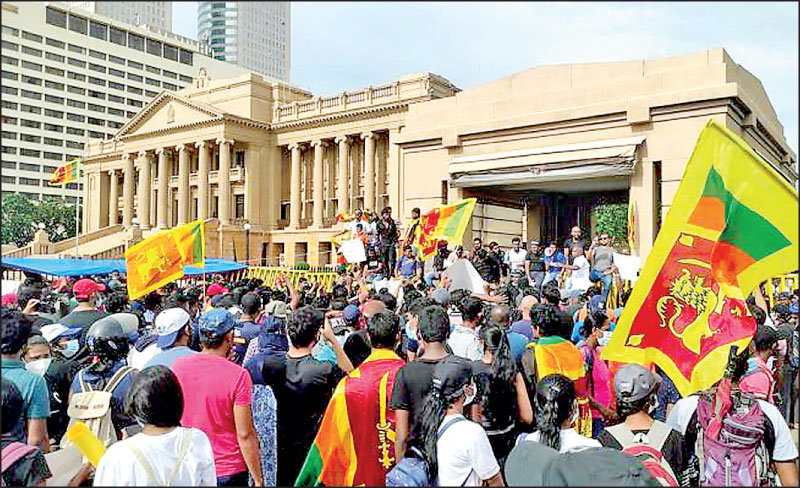Sunday Feb 15, 2026
Sunday Feb 15, 2026
Thursday, 28 November 2024 00:15 - - {{hitsCtrl.values.hits}}

The Aragalaya can now be declared over. What some elements of the population sought to do – bulldoze Parliament – has been achieved via the popular vote
 The Aragalaya or the struggle started in March 2022 and ended in November 2022 with the ouster and resignation of then President Gotabaya Rajapaksa. It was the result of deep and unprecedented public anger at the events of the previous year when in 2021 there was a complete breakdown of the economy, fuel and electricity and cooking gas were not available and people were in dire straits due to high double digit inflation. Sri Lanka then declared bankruptcy and till Indian assistance came in form of a much needed dollar infusion plus a good word with the IMF, Sri Lanka seemed to be on the brink.
The Aragalaya or the struggle started in March 2022 and ended in November 2022 with the ouster and resignation of then President Gotabaya Rajapaksa. It was the result of deep and unprecedented public anger at the events of the previous year when in 2021 there was a complete breakdown of the economy, fuel and electricity and cooking gas were not available and people were in dire straits due to high double digit inflation. Sri Lanka then declared bankruptcy and till Indian assistance came in form of a much needed dollar infusion plus a good word with the IMF, Sri Lanka seemed to be on the brink.
People blamed the corrupt practices of the Government of the time and their utter mismanagement of the economy for the crisis. And anger and disgust at the entire political dispensation found expression in violent ways too with many houses of politicians being burnt and them feeling the heat of public anger.
With Gotabaya Rajapaksa leaving office and temporarily the country, and Ranil Wickremesinghe taking over, the worst of the anger seemed dissipated and it seemed like everything would return to normal.
Ranil W as the new president enforced law and order very firmly. And a potential attempt to storm Parliament was thwarted by the police. It was deemed that such an act though a felt need of segments of the population (as a way of demonstrating anger at the political establishment) would destabilise the country and the economy even more.
Population squeezed from both sides
President Ranil Wickremesinghe and his team set about addressing the issues related to the economy and secured an IMF agreement that was crucial to get the country back on track. But the austerity measures agreed with the IMF and implemented resulted in an already struggling population (with increased prices due to inflation) now saddled with extra taxes finding themselves squeezed from both sides. The population used to the populist tax structure of the Gota regime had to suddenly absorb the impact of IMF driven taxes. This caused severe hardships to many in the population and though the Government and administration continued to communicate the need for this ‘bitter pill’ clearly it was too bitter for most.
Also the fact that Ranil Wickremesinghe relied on the same 225 politicians to set the economy right made him the target of accusations. He was called ‘Ranil Rajapaksa’ to suggest that he is a protector of the Rajapaksas.
The NPP under Anura Kumara Dissanayake, who in 2019 had only three seats in the 225 seat Parliament started actively organising themselves as an alternative on the back of the Aragalaya. They constantly reminded people of the misdeeds of the current crop of politicians and blamed them squarely for the plight of the people. And promised a new political culture if elected that would transfer power from the failed elite politicians and bring it to the ordinary man on the street (who he represents). The JVP which has a militant past, did not project itself and instead focused on a new brand NPP and an untainted leader AKD (Anura Kumara Dissanayake) as an alternative to the current crop.
The lead up to the 2024 Presidential election which saw a very aggressive campaign mounted by NPP under AKD who even visited many foreign countries including the US and India giving credence to the belief that his stock is rising among the masses.
The most important thing is that the on the ground activation of the campaign was very intense. While the UNP machinery on the ground was split between SJP and the few UNPers and with the SLPP folk keeping a low profile due to negative public sentiment towards them, AKD and his team mobilised voters effectively and efficiently.
The voter had spoken
The Presidential election in October saw Anura Kumara Dissanayake assume office with a significant gap over the next candidate Sajith Premadasa. The voter had spoken and it was clear the people wanted change even at the risk of empowering a party and leader who was previously inexperienced in governance.
Parliament was dissolved and the General election was called immediately. In exactly 54 days as the constitution provides. And the well-oiled election machinery of NPP continued its juggernaut on the same platform of ‘change’ and clean government.
The election results declared on 15 November 2024 are a watershed in Sri Lankan political history. The people have willed and voted for a complete change. Most old names no longer feature – the 2024 Parliament will have a totally fresh new look. Led by AKD as the President and his team in the NPP. Not only has NPP got a majority but it now has 159 out of 225 seats which gives it more than two-third majority to run the country. In a media interview prior to the General election, AKD was quoted as saying that they are looking for a simple majority (113) and that two-third majority are only sought by ‘oppressive’ regimes. Clearly the people have granted him more than what he sought.
The people of Sri Lanka have shown they do not have short memories. Certainly not if a smart politician keeps reminding them of their suffering and provides a credible alternative.
The Aragalaya can now be declared over. What some elements of the population sought to do – bulldoze Parliament – has been achieved via the popular vote.
Now the onus is on the NPP to deliver. To make sure the economy is revived. To ensure no defaults. To ensure compliance with all IMF obligations. At the same time to deliver on the people’s wishes – a transparent clean government that mitigates the suffering of the common man and provides hope and give fuel to the aspirations of the young in Sri Lanka.
Two cliched statements both proven true are apt at this stage. “With great power comes great responsibilities” and “Absolute power corrupts absolutely”.
Let’s hope and pray for the sake of the pearl that it’s the former that will be true here than the latter.
The Aragalaya ends. Now what’s next for Sri Lanka is the moot question.